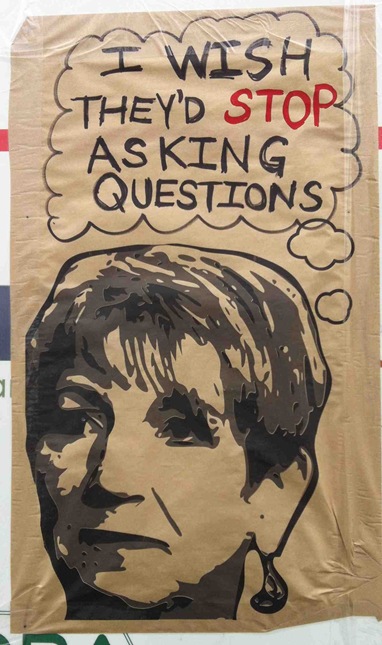Premier Kathy Dunderdale sounded genuinely exasperated last week when she chatted at length with Open Line show host Randy Simms about Muskrat Falls.
“Why,” she asked, “would a government want to develop a project that is not in the best interest of the province?”
No government would, of course.
No government ever has.
Not the current government, nor any in the past. Aside from a few naive people, the only ones who think otherwise are the nasty little partisan troll-shits who campaign with slogans like “no more give-aways” and actually believe their own propaganda.
What goes around, comes around, as the saying goes. That seems to be why Kathy is so frustrated these days. having come to power on the basis of the “no more give-aways” propaganda, she is finding herself on the receiving end of the same sort of foolishness that she and her colleagues used to peddle about their predecessors in government.
Regular readers will recall the warning about this sort of idiocy in a post about the
politics of history in Newfoundland and Labrador:
In eight years time, they may find that many of the changes they hoped for, like massive new industries, will still be little more than the fodder for someone else's rhetoric.
Karma is a bitch, after all.
For all that, Kathy Dunderdale is convinced she is on the right track. As she told NTV’s Issues and Answers in March, we “need to get to sanction.”
Nothing will persuade her to change her mind. And that, of course, is one of the surest ways there is to make a bad decision.
Go back to Kathy’s rhetorical question to Randy Simms. It suggests that
she has tied herself personally to the Muskrat Falls project. When you believe that fervently in your conclusion, you can do all sorts of things that can lead you astray
You can make a bad decision by only listening to people who agree with you. Kathy Dunderdale has done this already: she accepts as an expert conclusion the opinion of a lawyer with no experience other than what he’s gotten since taking up the appointment as “consumer advocate” on the public utilities board.
And you can make a bad decision by dismissing people who don’t. By contrast, Kathy Dunderdale suggested that former
Premier Brian Peckford had very little involvement in energy policy during his 15 years in government serving both as energy minister and Premier.
You can make a bad decision by assuming you are smarter than everyone else. Take a
gander at unofficial Liberal party leader Dean MacDonald talking to CBC’s Debbie Cooper. After slagging off the public utilities board as being nothing but disgruntled ex-Hydro employees, MacDonald notes that the people at Nalcor are among the smartest people in the world. They are the experts, according to MacDonald. And by extension they’ve got to be right.
You can hear the same sort of thing in the way Kathy Dunderdale talks about the project:
all the experts and all the smart people back the project, according to Dunderdale. How strange that Dean criticizes Kathy agree on everything, but yet they are perfect alignment when they talk about Muskrat Falls.
You can make a bad decision by believing false information. Kathy Dunderdale tied the two projects together in January in a speech to the
St. John’s Board of Trade:
The gatekeepers of the natural transmission route through Quebec were denying us fair opportunity to get the power to market, and having been burnt once on the Upper Churchill, we were determined not to let that happen again.
Quebec
does not have a stranglehold on Labrador development. It’s that simple.
You can make a bad decision by making a false connection between a current decision and the past one. Muskrat Falls proponents love to talk about Muskrat falls in the context of the 1969 Churchill Falls contract. In that January speech, Kathy Dunderdale made the approval of the Muskrat Falls project proof that the people of the province have broken the Churchill Falls curse:
Failure to take the right course of action today would be no different than taking the wrong course of action a generation ago.
Rejecting Muskrat Falls – even if it made perfect sense for economic and rational reasons – would be an emotional failure according to Kathy Dunderdale’s construction.
You can make a bad decision by jumping to a conclusion. Kathy Dunderdale may like to say that Muskrat Falls is about meeting the island’s
energy needs, but the truth is the project was a solution in search of a problem. The current provincial government committed to build something on the Lower Churchill in 2005. Danny Williams tied his retirement to building the Lower Churchill. After five years of trying, they couldn’t find any way to make it happen.
In 2010, they
decided to build Muskrat Falls alone. And everything since then has been a series of rationalisations to justify the conclusion they started with. They did not examine alternatives before deciding to build Muskrat Falls. They dismissed natural gas as being “
purely hypothetical”. They changed their story to claim they have looked at the alternatives and settled on Muskrat falls only after credible experts explained that natural gas from the local offshore is a viable, cheaper alternative to Muskrat Falls.
There are lots of ways to make a bad decision.
Your intention to do the right thing may not matter at all.
- srbp -
